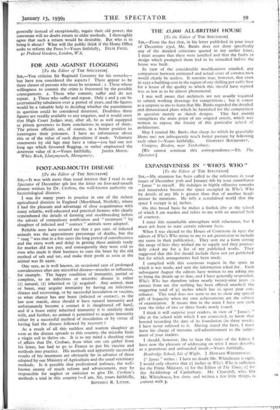FOOT-AND-MOUTH DISEASE
[To the Editor of THE SPECTATOR] SIR,—It was with more than usual interest that I read in my Spectator of December 9th last the letter on foot-and-mouth disease written by Dr. Crofton, the well-known authority on bacteriological diseases.
I was for many years in practice in one of the richest agricultural districts in England (Marshland, Norfolk), where I had the pleasure and advantage of close acquaintance with many reliable, well-educated and practical farmers who clearly remembered the details of farming and stockbreeding before the advent of compulsory notification and " treatment " by slaughter of infected and " contact " animals were adopted.
Reliable men have assured me that 2 per cent. of infected animals was the' approximate percentage of deaths, but the " snag " was that in a few cases the long period of convalescence and the extra work and delay in getting these animals ready for market did not pay, and consequently they were sold to men who made it their business to cure the beast by the old method of salt and tar, and make their profit as soon as the animal was fit again.
One sees, as is well known, an occasional case of prolonged convalescence after any microbial disease—measles or influenza, for example. The happy condition of immunity, partial or complete, to an infectious or microbic disease is either (1) natural, (2) inherited or (3) acquired. Any animal, man or beast, may acquire immunity by having an infectious disease and recovering, or by successful inoculation or vaccine, so what chance has any beast (infected or contact), as the law now stands, since should it have natural immunity and unfortunately become a contact it is slaughtered off hand, and if a beast enjoy inherited immunity it is similarly dealt with, and further, no animal is permitted to acquire immunity either by a successful method of inoculation or by virtue of having had the disease followed by recovery ?
As a result of all this ruthless and wanton slaughter as soon as the disease spreads to this country, the microbe finds a virgin soil to thrive on. It is to my mind a shocking state of affairs that Dr. Crofton, from what one can gather from his letter, has had to go to France to put his vaccine and methods into practice. His methods and apparently successful results of his treatment are obviously far in advance of those adopted by our Ministry of Agriculture and the usual veterinary methods. Is it possible that professional jealousy, the well- known enemy of much reform and advancement, may be responsible for neglect or omission to give Dr. Crofton's methods a trial in this country ?—I am, Sir, yours faithfully,
SEPTIML'S R. LISTER.






































 Previous page
Previous page